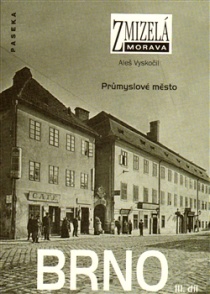
Two publications map the industrial history of Brno
 |
According to historian Aleš Vyskočil, Brno completely changed its character at the turn of the 18th and 19th centuries. "The rise of industry was so drastic, rapid, and astonishing that it had no equivalent in Central Europe at the time," Vyskočil stated in his book Brno - Industrial City, published by Paseka.
According to Vyskočil and the authors of the second publication Brno - Moravian Manchester, the development of the city was aided by weak cloth-making guilds, but also by the capital of the Loan Bank. The development of industry was fundamentally supported by two interventions from above. The issuance of the Tolerance Patent in 1781, which attracted non-Catholic experts to the city, for example, from Germany and present-day Belgium, and the abolition of serfdom. "The economic boom attracted thousands of people to the city, of whom only a part could commute regularly," Vyskočil noted.
The publication Brno - Industrial City maps the locations of individual factories, where they stood and what remains of them. It describes, for example, the Löw-Beer factories, which were related to the Tugendhats. Readers will also learn that Přízová Street is named after one of the few industrialists of Czech origin, Karel Příza. Interestingly, in addition to the usual textile products, ship sails for the Austrian Navy were also manufactured in Brno.
A large number of industrial enterprises no longer exist in Brno today. Only a portion of the buildings have found new uses in recent years. Vyskočil considers the transformation of the former Friedrich Wannieck machine shop into a department store and gallery to be successful.
In contrast, the buildings of the former Offermann factory, which stood near Vaňkovka, have completely disappeared. In their place stands a Tesco department store, and the industrialist's villa has also vanished. The history of the Offermann family is chronicled in the book by acclaimed prose writer Kateřina Tučková, titled Fabrika. The book combines, as is customary with Tučková, historical sources and fiction.
The English translation is powered by AI tool. Switch to Czech to view the original text source.
0 comments
add comment










